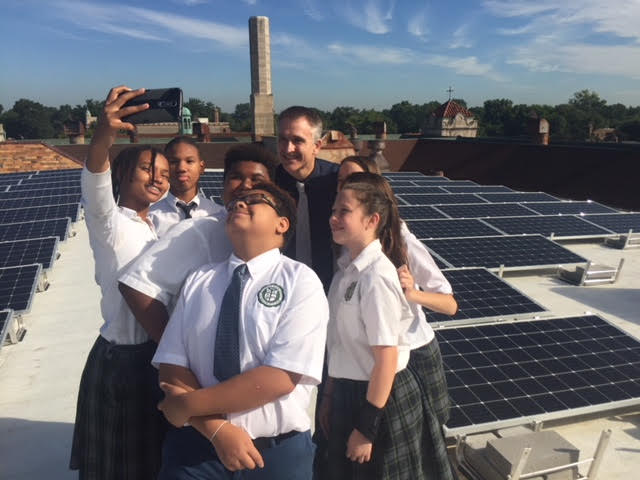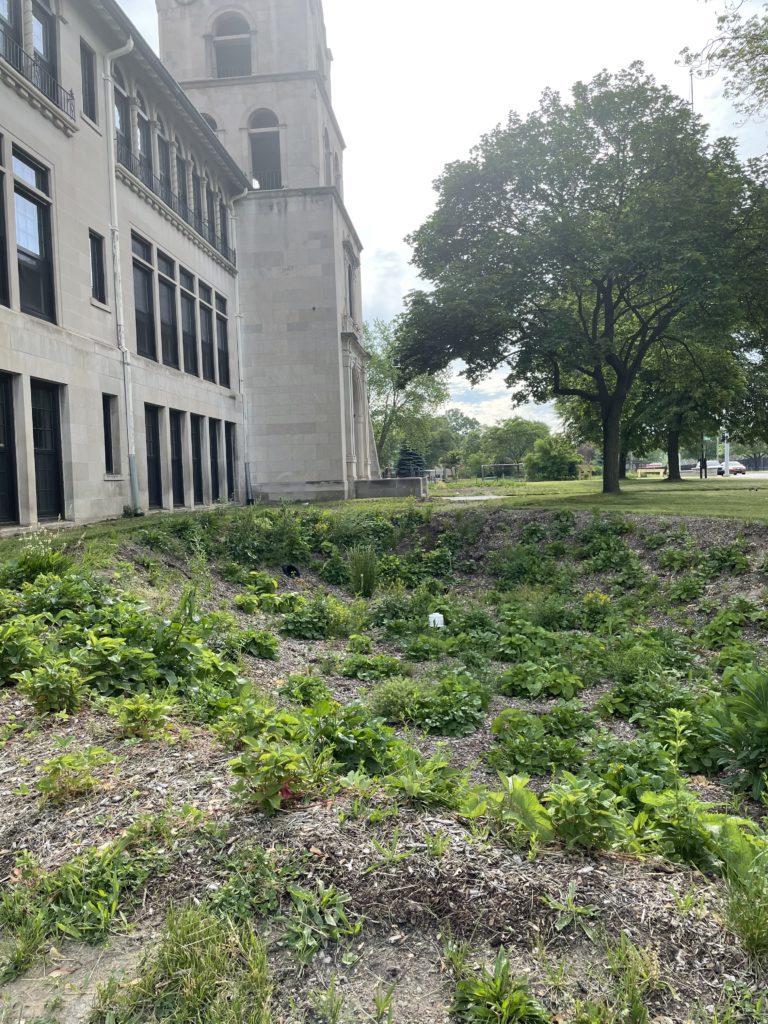By MegAnne Liebsch
January 31, 2022 — There’s only one way to get to the roof of Gesu Catholic School. You climb a two-story ladder through a trapdoor in the ceiling. You emerge from this portal into a sea of cobalt blue solar panels. A culmination of years of research, fundraising and collaboration, these panels are an immense source of pride for the students of Gesu’s solar club. Depending on the weather, the panels produce enough energy to cover 26% of Gesu’s electricity needs during the school year (and over 54% in the summer months).

Gesu School and the associated Jesuit parish stretches across six acres in the heart of Detroit. Designed in Spanish mission style with terra-cotta roof tiles and intricately carved facades, the school is elegant. It’s also 97 years old. Because of its age, most of Gesu’s facilities were inefficient and outdated. Upkeep was draining the school’s coffers, so development director Anita Sevier began researching ways to update school facilities — and make them sustainable.
Sevier gathered a group of 10 elementary school students interested in sustainability, which would become the solar club. She helped the students research solar energy and develop a submission for the My Solar School contest. If they placed in the contest, Gesu would receive a small sum toward solar panel installation.
“40% of the kids have asthma”
“There was a real breakthrough,” says Sevier. The kids quickly connected carbon emissions with asthma: Air pollution, particularly ground-level ozone common in urban areas, causes higher rates of asthma and lung disease. According to the solar club’s research, 8% of Americans have asthma, but in Detroit, asthma affects 27% of the population.
“And in our little solar group of 10 students, 40% of the kids have asthma,” Sevier adds.
Now, the project was personal. By switching to solar energy, Gesu could dramatically reduce its carbon footprint, helping to make Detroit’s air cleaner and healthier.
“We discovered that air pollution is the third leading cause of asthma,” solar club students said in their video submission to My Solar School. “By adding solar power we can hopefully reduce this trend.”
Their video earned Gesu 3rd place in the state of Michigan. The $500 prize alone wouldn’t cover the solar panels, so Sevier negotiated with Ford Motor Company and United Autoworkers (UAW) to price match Gesu’s fundraising efforts. After the solar club presented their appeal to Ford and UAW executives, the organizations agreed. Gesu raised $250,000, and Ford and UAW matched it.
Armed with half a million dollars, Gesu began its infrastructure overhaul in the summer of 2018, installing solar panels, restoring the school roof and rewiring the entire electrical system. Since then, the school has saved thousands on energy costs. In 2020 alone, Gesu pocketed a savings of $3,633.

Creating sustainable and sacred spaces
But Gesu didn’t stop there.
At Gesu Parish, the Green Team — a group of parish volunteers interested in environmental issues — began exploring ways to improve Gesu’s water usage. In 2018, Detroit’s water department began charging drainage fees to any property with impervious surfaces. Every month, Gesu would be charged $677 dollars per acre of blacktop and concrete.
“Gesu sits on a campus of six acres, so this is pretty significant,” says Stephanie Osborn, a member of the Green Team. Osborn and the Green Team attended workshops to learn how Gesu could use its existing gardens and lawn to capture more runoff and storm swells. By decreasing the volume of water that flowed off Gesu’s campus and into Detroit sewers, Gesu could reduce its monthly fee.
“I had heard if I spent $100,000 making drainage improvements, the water department would match me 50 cents on the dollar,” Sevier said. “So, I thought, that gives me $50,000 more. We don’t get much money around here, so I’m trying to figure out all the ways we can use this money.”

Sevier has a scrappy yet shrewd eye for numbers. She’s constantly thinking about how to maximize outcomes on a tight parochial school budget. By the summer of 2018, she had pooled $1.5 million in grants and fundraisers to complete a slew of infrastructure updates, including the solar panels and water management.
To divert water from Detroit’s sewers, Gesu first rerouted its gutters into 500-gallon cisterns in the school’s courtyard. The cisterns connect to gravity-fed hoses, which water the courtyard garden. The front lawn is likewise transformed. What was once a flat lawn is now a sloping rain garden, blanketed with native plants — black-eyed Susan, magenta-petaled echinacea and other coneflowers.
In total, the cisterns and gardens divert up to 3,000 cubic feet of stormwater at a time, which has helped reduce Gesu’s monthly drainage fee by 20%.
The gardens have garnered national attention. Gesu recently received the National Wildlife Federation’s Sacred Grounds certification, a program that recognizes faith communities who “both create wildlife habitat and actively link faith practices and caring for the environment.”
Lessons learned
Gesu Detroit is a powerful example of what is possible when we come together. Overhauling Gesu’s infrastructure required the partnership of students, teachers, parishioners, the pastor and staff. Plus, Gesu worked with outside organizations — Friends of the Rouge in Detroit, Nature Conservancy, the Sierra Club, the University of Michigan and the city water department.

While the projects required clever financing, their success is already offering returns. These updates will save Gesu tens of thousands of dollars in energy and water management.
“Gesu is not at all a wealthy parish,” says Green Team member Jane Hammang-Buhl. Located in Northwest Detroit, many of Gesu’s parishioners are middle class or low-income. “We knew if we were going to be involved in [sustainability projects], that we would really have to figure out how to pay for them. We had to show that it would eventually save the parish some money.”
The Green Team was diligent — submitting proposals and cost analyses, attending workshops, soliciting expert opinions — while Sevier gathered funds and facilitated the Solar Club. Ultimately, the gardens, the cisterns and the solar panels all bear the fingerprints of a dozen passionate people, united by the belief that they could make a difference right here, right now.
MegAnne Liebsch is the communications manager for the Office of Justice and Ecology of the Jesuit Conference of Canada and the United States. She holds an MA in Media and International Conflict from University College Dublin and is an alumna of La Salle University. She is based in Washington, DC.

